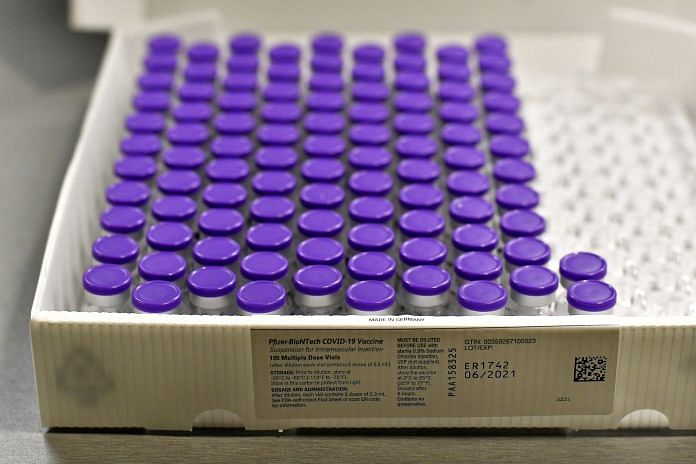New Delhi: Two new US studies suggest that messenger RNA (mRNA)-based vaccines could, in rare instances, be linked to myocarditis — a condition that can lead to heart failure. However, the data from the studies is insufficient to prove that the vaccine causes the cardiac condition.
In two separate studies published in the journal JAMA Cardiology Tuesday, scientists from the US described cases of heart attacks in otherwise healthy people who had received the mRNA Covid vaccines.
The first study from researchers at the Duke University Medical Center describes four cases of myocarditis, which refers to an inflammation of the middle layer of the heart wall and is usually caused by a viral infection.
A severe case of myocarditis can weaken the heart, which can lead to heart failure, abnormal heartbeat and sudden death.
The patients began to see symptoms of myocarditis within five days of receiving the second dose of mRNA-based Covid-19 vaccine. Two people received the BNT162b2-mRNA (Pfizer) vaccine and two received the mRNA-1273 (Moderna) vaccine.
Three of the patients were men aged 23 to 36 years and the fourth was a 70-year-old woman. All patients had severe acute chest pain, had abnormal electrocardiogram results and had evidence of heart tissue injury.
The study authors called for further investigation to determine link between Covid-19 vaccination and myocarditis.
The second report, from the US Military Health System, describes 23 individuals who developed acute myocarditis within four days of receiving the mRNA-based vaccine.
All patients were male and aged between 20-51 years. Of these, 20 people developed myocarditis after the second dose of an mRNA-based Covid-19 vaccine.
Here too, study authors call for further surveillance and evaluation of this adverse event following immunisation.
Earlier this month, another study from researchers in the US reported that seven male adolescents between the ages 14 to 19 who had received mRNA vaccines developed myocarditis within four days of receiving the second dose of the Pfizer vaccine.
Also read: Pfizer and Moderna vaccines likely to produce long-lasting immunity, study finds
Editorials in JAMA
In an editorial in JAMA Cardiology, experts from the US Centers for Disease Control and Prevention — the country’s top public health agency — said that given the striking clinical similarities in these patients, their recent vaccination with an mRNA-based Covid-19 vaccine and the lack of any alternative explanation, there was enough evidence to suggest a link between mRNA vaccines and myocarditis exists.
However, this link was too rare to be identified through clinical trials that enrolled less than several hundred thousand participants, they added.
“We do not know the specific mechanisms by which immunologic responses to mRNA-based COVID-19 vaccines could lead to myocarditis. Further investigation is critical and should be informed by the fact that most cases occurred following the second dose of a 2-dose series, some in patients with a history of prior Covid-19 infection,” the experts noted.
Meanwhile, in another editorial, the journal’s editors said that the decision to publish the two articles was not taken lightly, especially with ongoing fears related to vaccination among the population.
They noted that prior reports of adverse events following vaccination for measles, mumps, and rubella, which were later found to be unsubstantiated, raised significant public alarm and led to vaccine resistance, the effect of which continues to linger to this day.
As a result, they caution that the association found between mRNA vaccines and myocarditis does not establish causality.
Rather, these cases highlight the need for additional surveillance and investigation, the editors added.
The data, the journal editors said, displays the success of the formal and informal vaccine surveillance system in the US.
Moreover, the researchers from the US military study note that the potential for rare vaccine-related adverse events must be considered in the context of the well-established risk of morbidity, including cardiac injury, following Covid-19 infection.
India’s drug regulator granted restricted emergency use authorisation to Moderna’s Covid-19 vaccine Tuesday.
Also read: 27% Indians have got 1st vaccine dose, tribal areas doing better than the rest: Centre tells SC



